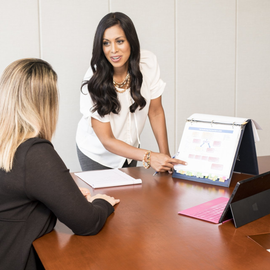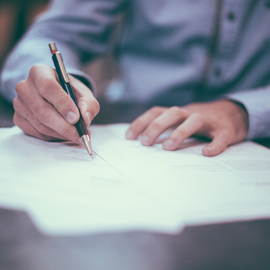Welcome To Young Injury Law
Young Injury Law is unlike any other personal injury firm. With us, you are not just another number.
Establishing lifetime relationships and making sure you are taken care of is our main priority. It is about
your recovery, making you whole – so it is about the money. And, when you receive your compensation, we
are here to help guide you to make informed, educated decisions. We are uniquely equipped to empower
you to get your financial affairs in order, protect yourself and your loved ones, and avoid court and conflict
in the case of your incapacity or death. As you already know, accidents happen every day – so it is critical
that you have proper, comprehensive planning so that you and your family are not at risk. This is an added
value of working with us where you get the benefit of the most complete recovery, but also the peace of
mind knowing that things will be handled the way you want should anything happen to you.
Establishing lifetime relationships and making sure you are taken care of is our main priority. It is about
your recovery, making you whole – so it is about the money. And, when you receive your compensation, we
are here to help guide you to make informed, educated decisions. We are uniquely equipped to empower
you to get your financial affairs in order, protect yourself and your loved ones, and avoid court and conflict
in the case of your incapacity or death. As you already know, accidents happen every day – so it is critical
that you have proper, comprehensive planning so that you and your family are not at risk. This is an added
value of working with us where you get the benefit of the most complete recovery, but also the peace of
mind knowing that things will be handled the way you want should anything happen to you.
Personal Injury
Accidents and Injuries can happen at any time, and the danger might not be as far from home as you think. Life changing events can occur from dangerous products...
Automobile Accidents
The aftermath of an auto accident can be overwhelming, but you are not alone. We can help hold the responsible parties accountable for their actions, and get you the...
Motorcycle Accidents
Riding a motorcycle on the open road is a big rush. Unfortunately, even the best attention to safety details can result in an accident. At Young Injury Law, we firmly...
Truck/Bus Accident
While buses and trucks provide helpful services, they can be extremely dangerous to passengers, other drivers, or pedestrians. Due to their increased...
Blog

You've been in a car accident you don't believe was your fault, and now you want a settlement to help cover the costs of medical bills, lost work time and wages, and other expenses associated with your accident. This is where a personal injury case comes into play. Collect All Accident Evidence After being involved in a car accident, the first thing you should do is seek medical attention. Of course, the severity of injuries vary by accident, but the most important thing to remember is to make sure you're healthy before moving forward with any other crash- related procedures. Once you've been given a clean enough bill of health to move forward, it's time to collect all accident-related evidence. Your accident lawyer will need this evidence as part of your personal injury case. Such evidence includes, but isn't necessarily limited to: A copy of the official police report. The other party's identifying information, such as: o Name. o Address. o Telephone number. o Car insurance policy information. Statements from any accident witnesses, as well as the witnesses: o Names. o Addresses. o Telephone numbers. Accident scene photographs, including pictures of: o All vehicles involved in the accident. o Any factors that could have contributed to the accident, such as weather. o Visible injuries you sustained. All medical records, including those from the EMTs and every doctor you see. Any records showing missed work and wages. As you can see, you'll have to collect some of this evidence—such as that proving missed work and wages—during the course of the personal injury case and not immediately at the accident scene. Contact a Personal Injury Lawyer Next, you should consider contacting a personal injury attorney. Sure, you can attempt to handle the case yourself, but an accident lawyer specializes in handling personal injury claims, and is skilled in going up against the other experienced attorneys that the big insurance companies will have on their sides. Your personal injury attorney can review the accident- and medical-related evidence you've presented (as well as suggest additional evidence you can collect to help your claim) and determine whether you have a personal injury case on your hands. If you do, your attorney then can begin the next steps. Attempt Negotiations Once you have a qualified personal injury lawyer on your side, his or her first step in the actual claims process probably will be to start a negotiation process. Basically, some claims don't need to go to trial; the lawyers (yours and the insurance companies') oftentimes can get together and work out a settlement that satisfies both parties. NOTE: Depending on factors such as the statute of limitations, many lawyers wait until you've reached the end of your medical treatment -- or can provide proof of the cost of necessary future treatments—before making demands during negotiations. When a satisfactory negotiation can't be reached, though, your lawyer will likely officially file your personal injury lawsuit. File a Personal Injury Case When negotiations don't work, it's time to file a personal injury lawsuit. Your personal injury lawyer will handle this step in its entirety for you; the important thing for you to remember, though, is that in most cases, patience is a virtue. Depending on the statute of limitations, it could take anywhere from months to years before your case actually reaches a courtroom. Begin Pre-Trial Litigation Generally, the discovery process is the first step in pre-trial litigation. The discovery process allows the attorneys to: Investigate legal claims and defenses. Request documents and ask questions of each other. Collect depositions (basically, statements) from witnesses relevant to the case. o This includes you (the plaintiff) and the other party and/or insurance company (the defendant). Sometimes during pre-trial litigation, the attorneys might begin mediation and negotiation processes again. At this point, if they can come to an agreement, you could receive your settlement; if not, it's likely your lawyer will move forward with scheduling the personal injury trial. Schedule a Personal Injury Trial Once mediations and negotiations don't work, your attorney and the court will schedule your personal injury trial. As mentioned above, you must practice patience at this point. Depending on a number of factors (such as the severity of your case, and the court's and judge's schedules), it could take months or years before your trial takes place and your claim is finally settled. However, once the trial comes to an end, you will receive your verdict. Keep in mind; if you receive a lesser amount—or nothing at all—when your verdict is reached, your attorney can advise you on the possibility of filing an appeal.

There are many benefits to hiring a personal injury attorney when you've been injured in a car accident, especially if your injuries are serious. The best move that you can make after you suffer a personal injury is to hire an expert. See below for some of the ways hiring a personal injury lawyer can help you deal with your claim. The accident happened so fast. Now, you are trying to heal from your injuries and get back to normal life. But the stress of everything keeps building. Your medical bills keep piling up. Your finances may have been affected because of your injury-related time off of work. What can you do to get back on your feet? Fortunately, there is something you can do. You can hire a personal injury attorney. A lawyer well-versed in accident claims can help immensely during this difficult time. The following are the top five reasons you should consider hiring a personal injury attorney: Experience with Car Insurance Companies / Protect your rights You don't deal with insurance companies every day. These lawyers do. They understand the process of reaching a settlement, and because they've seen cases like yours, most personal injury law firms have a good idea of the type of settlement you can expect. An attorney also understands how to negotiate with auto insurance companies to get you the fairest settlement possible. When a personal injury occurs, especially if it involves a large company, you can be certain that they will hire investigators and their lawyers will already be preparing to address your claim. Having an experienced attorney on your side will greatly enhance the possibility of success. One of the most important things an attorney can do for you right now is act as an advocate for you when dealing with the insurance companies. These companies are trying to protect their profits, not your health and welfare. Hiring a lawyer and ensure that someone looking out for you and your rights. Knowledge of the Law /Improves your odds An experienced personal injury lawyer knows the particular laws that apply to your accident. Because of this, they may see other avenues for settlement that you don't. This can be especially important if the accident involved an uninsured driver. Personal Injury laws, especially those related to car accidents and trucking accidents, are very complex and require a great deal of work, such as filing claims, making statements, documenting the incident, and work with insurance companies. With so much documentation and information, it’s important to have an expert handling the details for you. This will minimize potential mistakes or missteps that could determine your recovery. It’s highly likely that if you were in an auto accident and suffered an injury, you will be going against an insurance company if you decide to file suit. Undertaking this type of battle is highly difficult without a thorough knowledge of the law. There is probably no amount of preparation that you can take to match the knowledge of a seasoned attorney. Chances are, they will use your experience for their best interests and turn your case into a shambles. Proving fault is not that easy. We will help you establish proof that the accident wasn’t your fault. Having an experienced lawyer is absolutely crucial when it comes to proving your case. Knowing the law is our business. We will fight for you to be sure there is no doubt regarding the extent of your injuries. There are strict rules and guidelines when it comes to filing injury claims. Our personal injury attorneys are experts at knowing and understanding these issues. They are knowledgeable about things like the statute of limitations and complex paperwork filing procedures. Your lawyer will ensure you don’t lose out on what you’re entitled to simply because of a paperwork error,loophole or technicality. Understanding of Accident-Related Injuries Because lawyers who specialize in personal injury cases deal with injuries caused in car accidents frequently, a trained attorney may be able to make recommendations for medical tests and care you should explore. More importantly, he will understand the long-term effects, if any, of your injuries. This is vitally important in deciding whether a settlement offer is a fair one. Our experienced personal injury lawyers will help you get the compensation you’re entitled to. You may have injuries you’re not currently aware of or problems related to your accident that may never have occurred to you. Don’t make the mistake of giving money away simply because you didn’t know. Our attorneys know the laws regarding things like mental duress, pain and suffering and related medical expenses. Court Experience Finally, if you are unable to reach a settlement with an insurance company, or if the cost of the injuries exceeds the insured amount, a personal injury lawyer can represent you in court. This is essential if you have to sue the auto insurance company or others to get full coverage of your medical expenses and other pain and suffering. Maximize Compensation Maximizing the award you receive is, in many cases, the ultimate goal. If your injury is significant enough, there’s a good chance that you’ve lost wages and racked up massive medical bills, and that doesn’t even include the emotional distress you’ve suffered. A study conducted by the Insurance Research Council found that people represented by a personal injury attorney receive 3.5 times more money in damages than those who represent themselves. People who have been involved in accidents have a decision to make. Many accident victims will choose what they perceive to be the simpler, cheaper route – not hiring an attorney. However, retaining the services of a seasoned personal injury attorney will not only simplify the situation, but it will also strengthen your position and set you up to receive a much more substantial amount of compensation. We Offer Peace of Mind Having a lawyer on your side during this stressful time just makes sense. You’ve been hurt, lost wages, and are facing medical bills you can’t afford. You need an expert who is on your side and can provide you with the peace of mind to know that everything is going to be all right. That is perhaps the best reason of all to hire our personal injury attorneys.



















